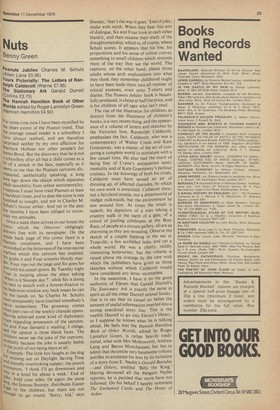Nuts
Benny Green
Peanuts Jubilee Charles M. Schulz (Allen Lane £5.95) Yours Pictorially: The Letters of Randolph Caldecott (Warne £7.95) the Stationary Ark Gerald Durrell (Collins 23.75) the Hamish Hamilton Book of Other Worlds edited by Roger Lancelyn Green (Hamish Hamilton £4.50) For some time now I have been mystified by the sheer extent of the Peanuts trend. That the average casual reader is a schoolboy I have always realised, and am therefore surprised neither by my own affection for Sherlock Holmes nor other people's for JaMes Bond. But the discovery that he is not a.sehoolboy after all but a child comes as a It of a smack in the face, especially as it ; seems to me that the Peanuts cartoons disa.PPeared, aesthetically speaking, a long I'me ago down the chasm which separates adult sensibility from infant sentimentality. I suppose I must have tried Peanuts at least a hundred times, and to date the score is one ,hurldred to nought, and not in Charles M. r°chulz's favour either. And yet in the past less' months I have been obliged to reconsider my attitudes.
Once a week there arrives in our house the comic which the Observer obligingly elivers free with its newspaper. On the IplIside back page of this comic there is a eabuts instalment, and I have been astonished at the bitterness of the inter necine sw.arfare which this cartoon has inspired. dlx grabs it and Four screams bloody murjr. Four rips out the page and Six goes for ,1111‘vith his cereal spoon. By Tuesday night "-our is moping about the place asking hen is it Snoopy day ?', while Six is doing llh!s best to attach with a forever-fixative to is bedroom window any back issues he can ay his hands on. So Charles M. Schultz Nisi presumably have touched somebody's I herve somewhere. The giveaway comes herl part two of the weekly charade opens. ; ;laving achieved some kind of diplomatic ; ,r,Llee regarding possession of the cartoon, 'Ix and Four demand a reading. I oblige, L,',11.d the upshot is three blank faces. The 'flildren never see the joke of the captions, tprobably because the joke is usually feeble he point of not being there at all.
r c)quriple: The little boy laughs at the dog acIr missing out on Daylight Saving Time :Id thereby overlooking supper; the pooch s'trinounces, `I think I'll go downtown and Y in a hotel for about a week.' End of Jci4e; hold your sides. Or again the same c'g, the famous Snoopy, distributes Easter to the children, but there are not "°ugh to go round. 'Sorry, kid,' says
Snoopy, 'that's the way it goes.' End of joke, shake with mirth. When they hear this sort of dialogue, Six and Four look at each other blankly, and then resume their study of the draughtsmanship, which is, of course, where Schulz scores. It appears that his line, his proportions and his sense of colour convey something to small children which reminds them of the way they see the world. The captions, on the other hand, please those adults whose arch explorations into what they think they remember childhood ought to have been leads them into all manner of critical excesses, even unto T-shirts and diaries. The Peanuts Jubilee book is beautifully produced, is cheap at half the price, and is for children of all ages who can't read.
The rise of the illustrator for children, as distinct from the illustrator of children's books, is a very recent thing, and the appearance of a volume of letters and sketches by the Victorian. lion, Randolph Caldecott, emphasises the fact. Caldecott, who was a contemporary of Walter Crane and Kate Greenaway, was a master of the art of conjuring a complete world in miniature with a few casual lines. He also had the merit of being free of Crane's antiquarian sentimentality and of Kate Greenaway's parlour cosiness. In the drawings of both his rivals, Caldecott must have sensed an air of dressing up, of affected charades, by which his own work is untainted. Caldecott drew, not a fairyland utopia, nor a dreamworld of midget milkmaids, but the environment he saw around him. At times the result is superb; his depiction of a man taking a country walk in the teeth of a gale, of a crowd of jostling celebrants at the Boat Race, of people at a picture gallery, all are as charming as they are revealing. Observe the sketch of a couple bathing in the sea at Trouville; a few scribbled lines, and yet a whole world. He was a chatty, mildly interesting letterwriter, but the volume is raised above the average by the care with which the publishers have given us those sketches without which Caldecott would have considered any letter incomplete.
In the meantime, I have it on the good authority of Eleven that Gerald Durrell's The Stationary Ark is exactly the same in spirit as all the other Durrell animal books: that is to say that its casual air belies the amount of useful information inserted into a strong anecdotal story line. This is the twelfth Durrell to go into Eleven's library, so I suppose he knows what he is talking about. He feels that the Hatnish Hamilton Book of Other Worlds, edited by Roger Lancelyn Green, is rather heavily traditional, what with Mrs Molesworth, Andrew Lang and Baron Munchausen, but has to admit that the entire very handsome volume justifies its existence for him by its inclusion of a story from E. Nesbit's Oswald Bastabk —and Others, entitled 'Billy the King.' Having devoured all the Penguin Nesbit reprints, he is puzzled that more have not followed. On his behalf I hereby nominate The Enchanted Castle and The House of Arden.


































 Previous page
Previous page